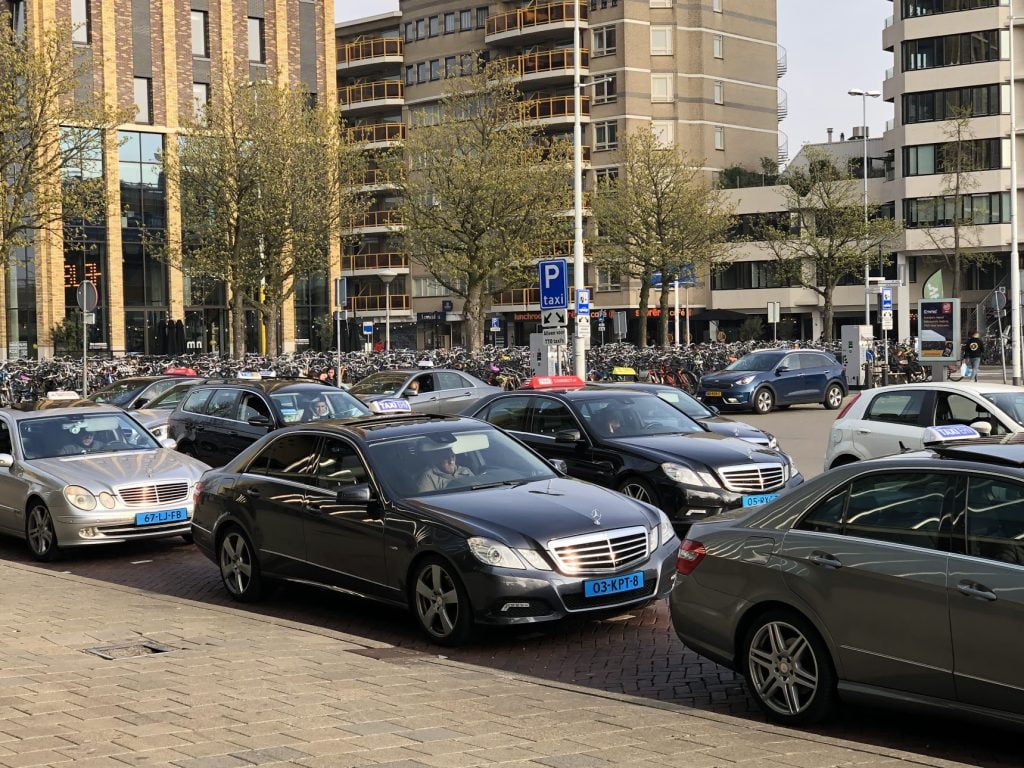Many municipalities have drawn up their own or additional quality policy by means of a municipal taxi regulation.
After each municipal election and installation of the new Municipal Executive, the local rules in most cities or municipalities are re-examined. A new alderman for Mobility or a changed Municipal Executive often means that things are changing. Many municipalities have drawn up their own or additional quality policy by means of a municipal taxi regulation.
Amsterdam
The policy of alderman Melanie van der Horst in Amsterdam often has a major influence on the taxi policy in other cities with a Regulation. Cities and municipalities look at what people do in Amsterdam to determine what they will and will not adopt. A covenant was signed with the municipality of Amsterdam regarding clean taxis in 2025, which will be further elaborated. The TTO construction will be lifted, but it is not clear what will replace it. On the one hand, Amsterdam is on the eve of abolishing the TTO system and, on the other hand, the introduction of the Zero Emission Zone Taxi in 2025, with an exception for healthcare transport, according to the KNV.
Arnhem
In 2019, the ordinance was adopted in the Arnhem city council, the implementation of which was scheduled for November 1, 2020. Due to corona, this date was postponed indefinitely. Consultations between the alderman and the local foundation (SKTA) have resulted in the introduction being linked to the situation of the taxi ranks at Central Station and in the centre. A solution must also be found for the situation at the Gelredom.

Breda
In Breda in Brabant, the number of snorers is a problem. In the city there is a taxi regulation and a local foundation (SKB) that issues the local quality label for drivers who are active in the step-up market and on the basis of which they receive a permit from the municipality. Breda bears the costs of the support and appoints the board members. The SKB works together with the Breda catering stewards in the field of enforcement on nights out.
Den Bosch
The current taxi permit of the taxi drivers on the entry-level market expired on January 1, 2022. Draft adjustment by the former alderman included checking the national taxi requirements digitally and in advance, abolition of the local SBK foundation, no or hardly any checks on the street, extra costs for drivers with regarding certificates.
According to the KNV, the attitude of the SBK, which issues the local quality label, and the control at the front are fine, but control on the street is badly needed to guarantee and improve quality, with SBK in the form of service teams and mystery guest rides can play a role. The permits for the drivers were extended for the year 2022 and this will also apply for the year 2023.
The Hague
In 2014, the municipality introduced TTO permits with a validity of 5 years, in 2019 it was decided to extend these for another 5 years at significantly lower costs than before. In the meantime, the municipality has asked the Rebel Group to evaluate the taxi policy. The local organization STH (which issues the HTx) has given a substantive response to the evaluation report and has made proposals for amendments to the new taxi regulation.
Key points include more effective enforcement and a level playing field in the entry and order market. There is no substantive response from the municipality. Since August 1, 2022, an interim mobility manager has been appointed at the municipality. STH and the Municipality of The Hague have held consultations and some tentative results have been achieved. After years of standing still on the taxi file, there is finally some movement in the taxi policy of this municipality.
Eindhoven
In Eindhoven, two issues play a role for taxi drivers in the entry-level market, namely insufficient enforcement and the upcoming long-term work at Central Station, with taxi ranks disappearing. The question is whether, and if so, how many taxi places will be returned and what alternative the municipality offers for taxis. The work will take years.
The local foundation (SEK), which issues the ETx, is following developments closely and is in consultation with the municipality about this situation. The TTO permits will expire in September 2022 and the TTOs have applied for a new permit. At the suggestion of SEK, the municipality has extended the TTO permit until July 1, 2024 without charging fees. Lately, taxi drivers have been asking bizarre prices from customers, against which there is hardly any action. A worrying situation.

Maastricht
The municipality of Maastricht has conducted an exploratory study into the possibilities of regulating the entry level market in the city to some extent. There will be no Maastricht Taxi Ordinance because the current problem is limited to parking problems for taxis at CS and the problems with ordered transport at MECC. However, the municipality has committed to more and better enforcement.
Rotterdam
In Rotterdam, there is good contact between the sector and the city officials with regard to enforcement. The municipality has taken the necessary measures with regard to training drivers for the local quality label (RTx), which has been placed with a different party than before.
Rotterdam wants to amend the Taxi Regulation. The sector was consulted in 2022 and various scenarios were presented to the alderman in the autumn. This has not been shared with the industry. The outcome of the alderman's choice is not yet known to the taxi industry. This year, things should become clearer.
Utrecht
There is no local foundation in Utrecht. The municipality itself issues the permits to drivers who meet the requirements. Number of taxis on the entry market is fairly limited. A point of attention is that taxis are not allowed to make sufficient use of public transport lanes in the city. This concerns the access to the Leidseveertunnel. Industry association KNV is in consultation with the taxi industry and the Province and Municipality of Utrecht on this point. Differences of opinion remain for the time being.
Royal Dutch Transport
In most cities, KNV is directly involved with the municipality with Taxi Regulations aimed at the boarding market, because the authority that the WP2000 provides to municipalities is limited to that. KNV is in favor of such Taxi Regulations, because they remove the anonymity of the drivers and it leads to an improvement in quality and taxi policy.



